Library
All resources
1901 – 1920 of 2421 results
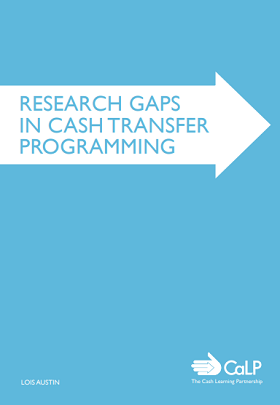
Research gaps in cash transfer programming
Report
Gathering evidence through action research is one of the ways that the CALP Network aims to improve cash transfer programming (CTP) implementation and raise awareness about CTP and its use as an appropriate and effective mechanism for emergency response. Before defining potential research topics for 2014,...
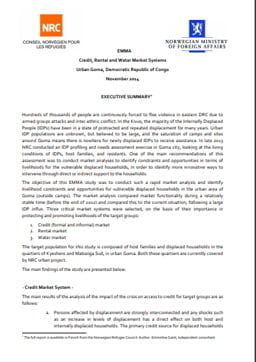
NRC – EMMA on Credit, Rental and Water Market Systems, Urban Goma, DRC, Nov 2014 – Executive Summary
Report
Hundreds of thousands of people are continuously forced to flee violence in eastern DRC due to armed groups attacks and inter-ethnic conflict. In the Kivus, the majority of the Internally Displaced People (IDPs) have been in a state of protracted and repeated displacement for many years. Urban IDP...

Market Analysis for Preparedness: The urban informal settlements of Nairobi
Report
The last few years have seen a significant change in the way humanitarian organisations approach response design. Partly spurred on by the growth in cash transfer programming and market-based programming, the practice of working through and supporting local markets is now widely considered best practice...
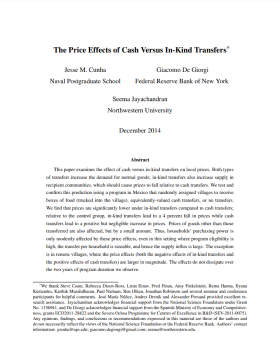
The Price Effects of Cash Versus In-Kind Transfers
Report
This paper examines the effect of cash versus in-kind transfers on local prices. Both types of transfers increase the demand for normal goods; in-kind transfers also increase supply in recipient communities, which should cause prices to fall relative to cash transfers. We test and confirm this prediction...
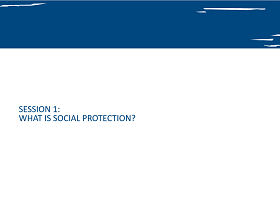
What is social protection?
Report
This presentation was made on behalf of UNICEF at the social protection framework validation meeting that took place at the Jacaranda Hotel in Nairobi, Kenya on 26 September 2014. It looks at components and dimensions of social protection, lessons from global experiences and some limitations of the...

The CALP Network Level 2 Training – Module 3 – Selecting, designing and implementing CTPs
Guidelines and Tools
The objective of the Level 2 training is to strengthen the capacity of humanitarian actors in cash transfer programme design and implementation, to share recent research and learning, and encourage advocacy, institutionalisation and coordination in cash transfer programming (CTP). This training follows...
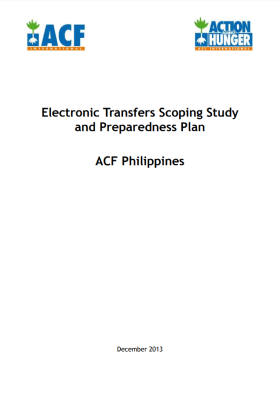
Electronic Transfers Scoping Study and Preparedness Plan
Policy paper
This piece of work was arranged by Action Against Hunger (ACF), with the intention of understanding the electronic payment services available in a minimum of two country missions and to support ACF in preparing for future humanitarian response in country and globally, with a specific focus on...
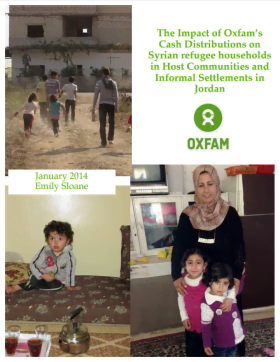
The Impact of Oxfam’s Cash Distributions on Syrian Refugee Households in Host Communities and Informal Settlements in Jordan
Report
Given the absence of viable alternatives to cash transfer programmes (CTPs) in Jordan, such programmes will certainly continue for the foreseeable future. It is crucial to review their impact to date in order to identify common issues and lessons learned and adjust programmes accordingly. The present...
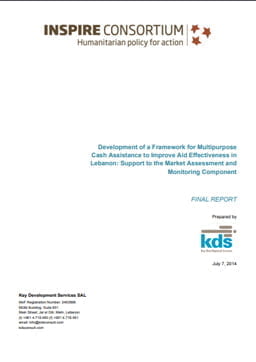
Development of a Framework for Multipurpose Cash Assistance to Improve Aid Effectiveness in Lebanon: Support to the Market Assessment and Monitoring Component
Report
The objective of the three market assessments presented in this report is to provide the interagency cash transfer programming working group (CTPWG) with meaningful and actionable information on the market impact of cash assistance in Lebanon. This report is also intended to inform decision making on...

Regional Learning Event: “Links between emergency cash transfer programming and social safety nets in the Sahel.” – Final report
Report
Cash transfers are nowadays widely used in response to the food and nutrition crises that affect the Sahel. Since the crisis of 2012, many stakeholders (including governments, United Nations agencies, international or local non-governmental organisations) have made use of them – at scale, in some cases....
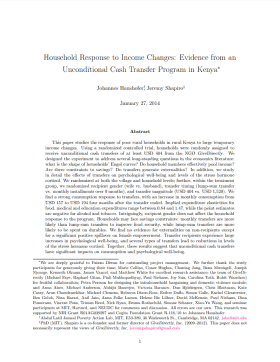
Household Response to Income Changes: Evidence from an unconditional cash transfer program in Kenya
Report
This paper studies the response of poor rural households in rural Kenya to large temporary income changes. Using a randomized controlled trial, households were randomly assigned to receive unconditional cash transfers of at least USD 404 from the NGO GiveDirectly. We designed the experiment to address...
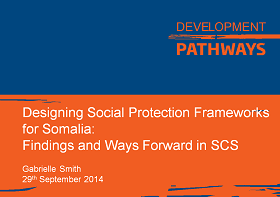
Designing Social Protection Frameworks for Somalia: Findings and Ways Forward in SCS
Report
This presentation was made on behalf of Development Pathways at the social protection framework validation meeting that took place at the Jacaranda Hotel in Nairobi, Kenya on 26 September 2014. It looks at designing social protection frameworks for Somalia and covers: 1.Activities and Methods 2.Macro...
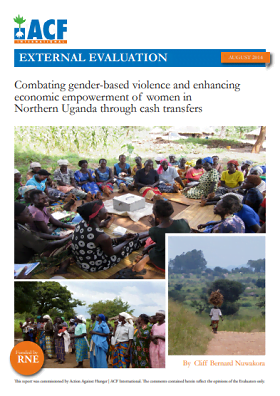
Combating gender-based violence and enhancing economic empowerment of women in Northern Uganda through cash transfers
Report
The aim of this evaluation is to assess the relevance, sustainability, effectiveness and efficiency of the programme. Moreover, the evaluation will assess the impact of the programme on women and girls in relation to livelihoods and economic empowerment and access to social services, including education,...

Is Cash Transfer Programming ‘Fit for the Future’? – Executive Summary
Report
This summary presents the results of a 2013 research study entitled, Is Cash Transfer Programming ‘Fit for the Future’? The research was commissioned by the the CALP Network and undertaken by the Humanitarian Futures Programme (HFP), King’s College London. The project intends to understand...
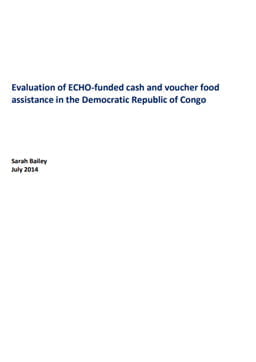
Evaluation of ECHO-Funded Cash and Voucher Food Assistance in the Democratic Republic of Congo
Report
People in eastern Democratic Republic of Congo (DRC) have long faced protracted conflict and instability resulting in the displacement of populations. In order to provide households affected by new displacements with timely access to food, ECHO funded the Norwegian Refugee Council (NRC), the Association...
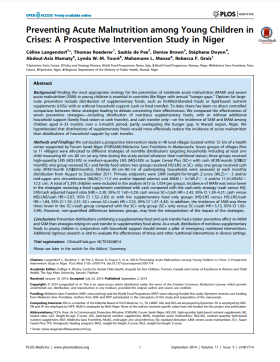
Preventing Acute Malnutrition Among Young Children in Crises: A prospective intervention study in Niger
Report
Governments and donor agencies need to know which preventative strategy is most effective, particularly among children under 2 years old who are most vulnerable to acute malnutrition. Here, the researchers compare the effectiveness of seven preventative strategies—including the distribution of...

Guidelines for Conditional Cash-for Rent Assistance for Syrian Refugees in Jordan
Guidelines and Tools
The objective of these guidelines is to inform Shelter sector partners of best practices for implementing conditional cash-for-rent assistance targeting Syrian refugees in the host communities. These guidelines have been developed by a taskforce of the Shelter Working Group.

Humanitarianism in the Age of Cyber-warfare: Towards the Principled and Secure Use of Information in Humanitarian Emergencies
Report
Humanitarian assistance is driven by information. From early warnings to needs assessments to final evaluations, information determines priorities and resource allocation. In addition, a crisis drives people to collect and share personal information that they otherwise wouldn’t: the names of missing...
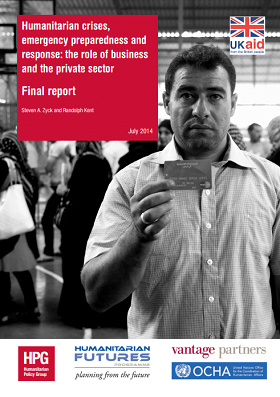
Humanitarian crises, emergency preparedness and response: The roles of business and the private sector – final report and case studies from Indonesia, Kenya, Jordan and Haiti
Report
The private sector has long been a major contributor to humanitarian action. At the community level, businesses frequently use their materials and resources to aid people affected by crises. As local markets recover and supply chains are repaired, crisis-affected people are once again able to access basic...

Is Cash Transfer Programming ‘Fit for the Future’? – Final Report
Report
This report presents the results of a 2013 research study entitled, Is Cash Transfer Programming ‘Fit for the Future’? The research was commissioned by the the CALP Network and undertaken by the Humanitarian Futures Programme (HFP), King’s College London. The project intends to understand...